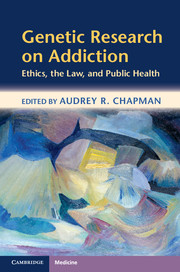Book contents
- Frontmatter
- Contents
- Contributors
- Preface
- Section 1 Introduction
- Section 2 Research ethics
- Section 3 Translating addiction research
- 11 The public health implications of genetic research on addiction
- 12 Genetics, addiction, and stigma
- 13 Lay beliefs about genetic influences on the development of alcoholism: Implications for prevention
- 14 Personalizing risk: How behavior genetics research into addiction makes the political personal
- Section 4 Conclusions
- Index
- References
13 - Lay beliefs about genetic influences on the development of alcoholism: Implications for prevention
from Section 3 - Translating addiction research
Published online by Cambridge University Press: 05 September 2012
- Frontmatter
- Contents
- Contributors
- Preface
- Section 1 Introduction
- Section 2 Research ethics
- Section 3 Translating addiction research
- 11 The public health implications of genetic research on addiction
- 12 Genetics, addiction, and stigma
- 13 Lay beliefs about genetic influences on the development of alcoholism: Implications for prevention
- 14 Personalizing risk: How behavior genetics research into addiction makes the political personal
- Section 4 Conclusions
- Index
- References
Summary
Medical researchers say they have pinpointed for the first time a gene that may make people prone to alcoholism, adding weight to the belief that alcoholism is a disease and not a weakness.
(Coleman, 1990, appearing in the San Jose Mercury News)
Medical science has increasingly focused attention on the identification of genes associated with the development of a range of diseases and characteristics (Collins and McKusick, 2001; Guttmacher et al., 2001). One goal of this research is to identify, primarily by means of genetic testing, individuals at increased risk for various conditions in order to target preventive interventions (Kardia and Wang, 2005; Omenn, 2005). As part of this effort, it is thought that individuals who understand they are at higher risk due to their genetic makeup may be motivated to engage in preventive behaviors (Gable et al., 2007). However, research is equivocal with regard to the type of effect genetic explanations have on such attitudes. Although several studies suggest genetic explanations can result in greater motivation to reduce risk (Frosch et al., 2005; Chao et al., 2008; Sanderson et al., 2008), some scholars argue that, conversely, genetic explanations can result in fatalistic attitudes toward prevention (Alper and Beckwith, 1993; Macintyre, 1995) that may impede risk-reduction efforts. Both these potential effects of the use of genetic explanations have important implications for preventive behaviors. In this chapter, however, we do not examine the cause-and-effect relationship between genetic explanations for alcoholism and the motivation to engage in preventive behaviors directly. Instead, we take a step back to illuminate and explore the potential links between genetic explanations and illness representations that potentially influence such motivation, and we speculate how these links might function to influence preventive behavior. We focus on three research questions: (1) To what extent does the lay public employ genetic factors to explain the development of alcoholism?; (2) What do genetic explanations for alcoholism imply in terms of the perceived stability and controllability of developing this condition?; and (3) To what extent do risk perceptions for alcoholism predict the use of genetic explanations?
- Type
- Chapter
- Information
- Genetic Research on AddictionEthics, the Law, and Public Health, pp. 195 - 212Publisher: Cambridge University PressPrint publication year: 2012
References
- 1
- Cited by



